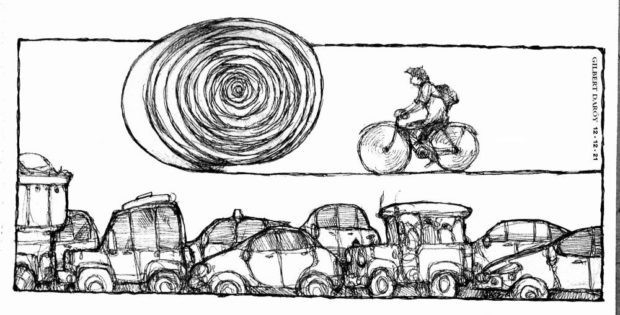Safer biking for all

It took a global health crisis for the public to take a critical look at mobility options and rediscover a healthier and more environment-friendly transport alternative: biking. But the emerging bike culture also highlighted the glaring lack of basic safety measures in busy urban roads, particularly in Metro Manila where accidents involving bicycles saw an almost 50-percent jump last year.
Data from the Metropolitan Manila Development Authority (MMDA) show that there were 2,606 bike-related crashes in 2020, a 48 percent increase from 1,759 in 2019; the number covers only those officially reported.
In June last year, the MMDA recorded more than 100,000 cyclists passing through Edsa, the country’s busiest thoroughfare. Today, per the estimate of cycling advocacy group MNL Moves, at least half a million people in Metro Manila pedal to work. This makes it even more imperative for urban planners to ensure that road networks are safe for riders, especially now that, with restrictions lifted, economic activities are reverting to the pre-pandemic old normal, including more cars and traffic gridlock on the roads. Reckless car drivers, unclear or missing road signs, potholes, and absence of dedicated bike lanes are among the most common dangers that riders face on the road daily.
As the pandemic has shown, however, some cities were more ready than others to provide friendly road space for cyclists. Iloilo City is undoubtedly the gold standard, boasting an 11-kilometer bike lane that includes a four-kilometer protected lane marked by lines on the pavement and plant boxes that serve as barriers to prevent cyclists from driving into the main road. The city, dubbed as the “Bike Capital of the Philippines,” has organized an annual bike festival since 2013 and was recognized as a bike-friendly city in 2018. Last month, the Department of Transportation (DOTr) and the Department of the Interior and Local Government gave Iloilo the Gold Award in the first National Bike Lane Awards. The award recognizes local governments that created more inclusive and sustainable road infrastructure networks deemed safe for bike commuters.
Two Metro Manila cities were also recognized. Pasig received the Silver Award; since 2018, it has been advocating the use of bicycles as an alternative transport mode through its Pasigreen Bike Share program, which initially offered 100 bikes for use around Ortigas Center. The city government also closes to all kinds of motorized vehicles the busy Emerald Avenue on Sundays, providing residents and visitors a safe place to bike or exercise. Quezon City, meanwhile, got the Bronze Award, and was cited for being one of the most aggressive in pushing for cyclist protection, including guarded bike lanes.
For its part, the national government, through Presidential Proclamation No. 1052 issued last year, declared every fourth Sunday of November as “National Bicycle Day.” Last July, the DOTr and the Department of Public Works and Highways inaugurated the country’s longest bike lane network—some 313 kilometers that weave through 12 cities: Pasig, Marikina, Quezon City, Caloocan, Manila, San Juan, Mandaluyong, Makati, Pasay, Las Piñas, Parañaque, and Taguig.
These initiatives are all well and good, and are necessary steps in achieving a safer road environment for riders. But they have to be matched by adequate laws to ensure that regulations are in place and are enforced. One such measure, Senate Bill No. 775 or the proposed Magna Carta for Dignified Commuting, was filed by Sen. Kiko Pangilinan in 2019 but has languished at the committee level.
The bill bats not only for more protection for riders, but also for commuters and pedestrians in general, through adequate public transport and proper mobility infrastructure such as wide footpaths, sidewalks, and bike lanes. It also pushes for mandatory training programs for drivers, especially of public vehicles, and a more stringent licensing process.
Bikers have complained not only about the dearth of proper facilities but also the lack of information and education among cyclists, motorists, and pedestrians on how to share the road properly and responsibly. In Brazil, for instance, bus drivers are made to ride bicycles as part of their training so they would experience how it feels to be on the other side of the road.
Car users account for only 12 percent of the population, yet 80 percent of the country’s roads are designed for private cars, according to Market Research Philippines, and only 18 percent for public transit and 2 percent for pedestrians and micro vehicles. Thus, inclusive transport, mass transit, urban planning, parks and open spaces, etc. should be legitimate issues in next year’s elections. The reset offered by the pandemic in favor of active transport needs sustained effort from those who will rule the land.




















